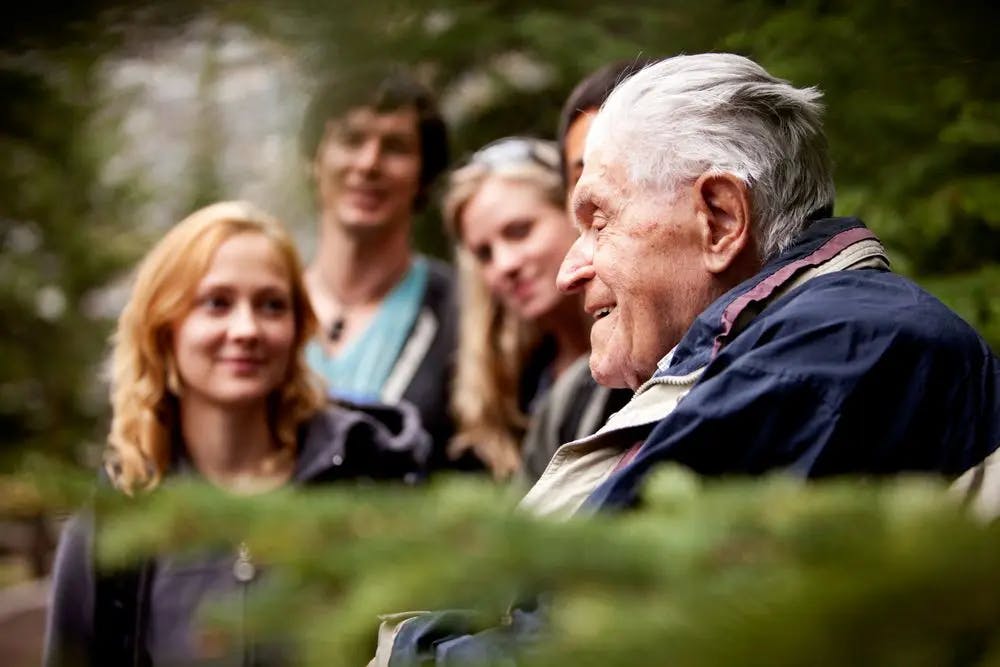How Often to Visit Elderly Parents and Relatives

Estimated Reading Time: 6 minutes
When an elderly parent, relative or other close loved one moves into a care home, it can cause a big change to your usual routine. Especially if you were acting as a carer for them, it can be difficult to recognise when and how often to visit now they are receiving support.
Being able to find the balance in your own life as well as theirs is important, so here are our tips on how often you should visit your elderly parents and relatives.
Browse recommended local homes
Compare care homes with availability near you.
How Often Should I Visit?
There’s no right answer to how often you should visit your elder family members as everyone’s personal situations are different. Factors like distance and family dynamics will play a part. Some people will visit their loved one in a care home a few times a month, while others will make more or less frequent visits.
With that said, many different studies prove the social isolation of the elderly is associated with cognitive decline, a decline in health and depression. Regular visiting is vital for reassuring your loved ones that you are there for them, so deciding how often you visit is simply down to how often you can manage to with your schedule.
A good way to find out how often people visit their loved ones in care homes is to ask the staff as they will be able to gauge how often a visit can benefit your loved one, as they are the ones spending the most time with your loved one.
The Benefits of Visiting Elderly Parents and Relatives
There are so many benefits that come with visiting your elderly parents and relatives. From combatting feelings of isolation to letting them know how important they are to you, it's a great way to brighten up their day!
It can help combat loneliness - According to AgeUK, there are 1.4 million chronically lonely older people in England. By visiting and keeping in touch with your elderly parents and relatives, you can help reduce that statistic and impact their mental health in a positive way.
You can ensure they are receiving good care - If your elderly loved one is living in a care home, it should be a fact they are receiving high-quality care from the staff. However, it is unfortunately sometimes the case where residents are not receiving the correct levels of care or are experiencing some form of neglect. Not only will visiting regularly give you peace of mind that they are in a safe environment, but it can also allow you to build a good relationship with their carers.
It can help your elderly relative feel useful - If your loved one is no longer able to tackle the physical tasks they were once able to, they feel helpless. Talking to them and asking questions can help to them feel useful and needed. Regular visits can help care home residents stay engaged in life and it gives them a chance to hear about their family, the people they care about the most.
We’re here to help you find the right care home for you or your loved one. You can request a free list of care homes from our Care Experts, who will then share homes matching your budget, location and type of care needed. You can also search for care through our easy-to-use directory.
Tips for Visiting a Loved One in a Care Home
It’s easy to load guilt on yourself if you think you aren’t visiting enough, but there are many different ways you can make the most of your visits so that you and your elderly family members can cherish the time that you spend together, no matter how often it is.
Be aware of their daily schedule - After moving into a care home, your elderly loved one’s schedule may have changed slightly, so it's best to find out what time fits into their schedule. Calling ahead and asking the staff when a good time to visit is a great idea.
Take another family member or friend with you - When you’re loved one is living in a care home, they may feel like they see the same people all the time. Perhaps you could take one of their friend’s or a younger family member like a grandchild with you to brighten their day up! Be sure to notify the care home staff that someone will be an additional visitor joining you.
Physical touch - Although this hasn’t been possible in recent years, giving your elderly parent or relative a warming hug or just simply holding their hand can be extremely comforting to them, especially if they are not yet settled into their care home. If they like physical affection, this is a great way to feel connected.
Engage in conversation - For some, visiting an elderly relative may seem like a repetitive task, but for the elderly, it can be the brightest part of their day. By conducting an engaging conversation by asking extra questions and asking how they feel rather than being distracted, you can make your loved one’s day.
What Not to do When Visiting a Care Home
Whilst it may be a familiar act, it’s important to not interfere with the care of other residents in care homes it is the nurses and carers role and it may not be safe for you to do so. It’s important to build good relationships with the carers and nurses as they are a great source when it comes to finding out how your elderly parent or relative is doing.
It also may not be possible to be able to visit your loved one as much as you would like and it’s important to not feel guilty about this. Your loved one is receiving the best level of support: they will have a wealth of companions and brand new friends in their new home.
When your elderly parent or loved ones move into a care home, it can take a while to adjust and figure out a new visiting routine, especially if you are used to being a care provider for them. Regular visits can give you peace of mind that they are in good hands and are receiving the care they need.
Lottie matches care seekers with the best care homes for their needs. You can request a free care home shortlist from our Care Experts, who will share homes matching your budget, location and type of care needed. You can also search for care through our easy-to-use directory.




